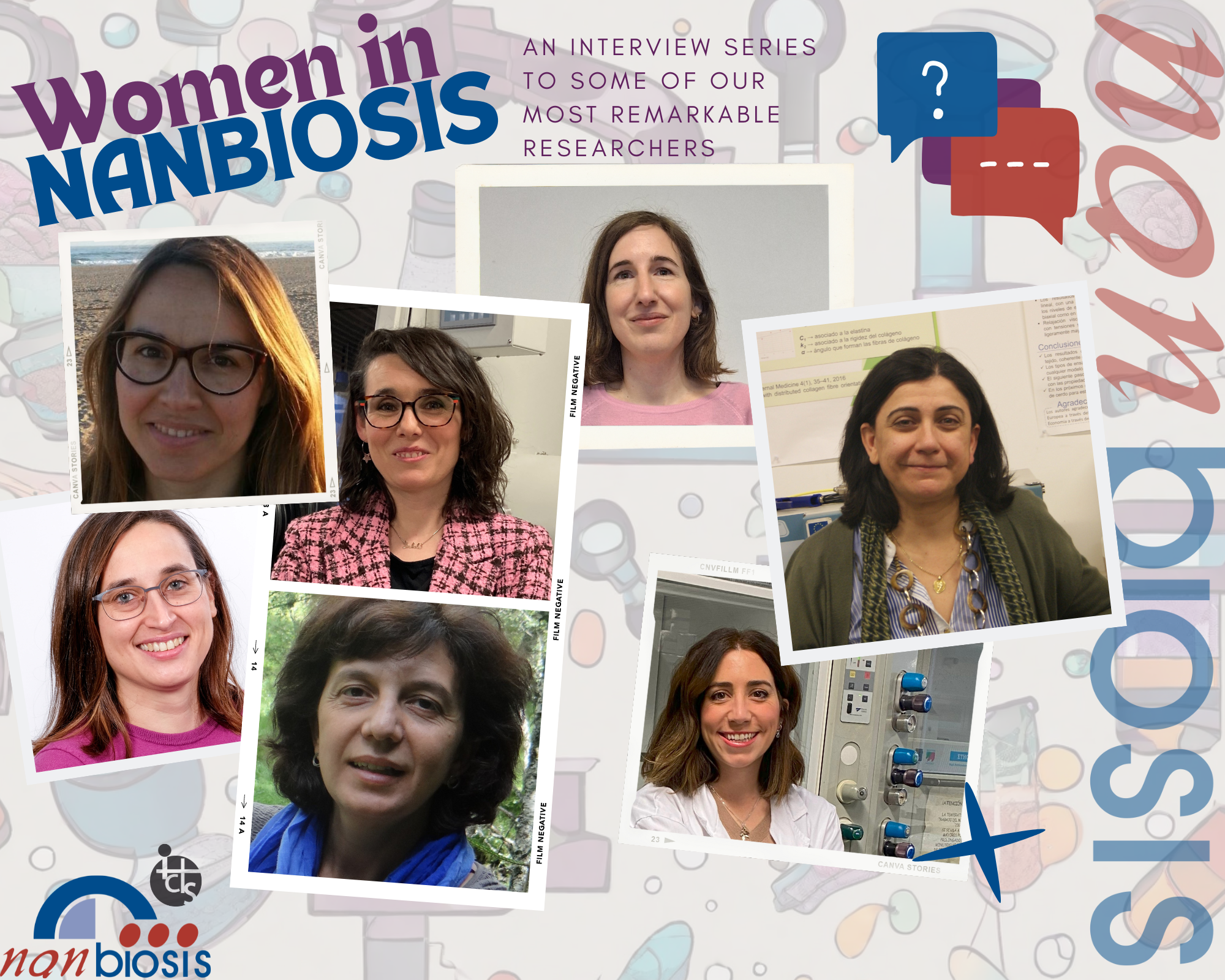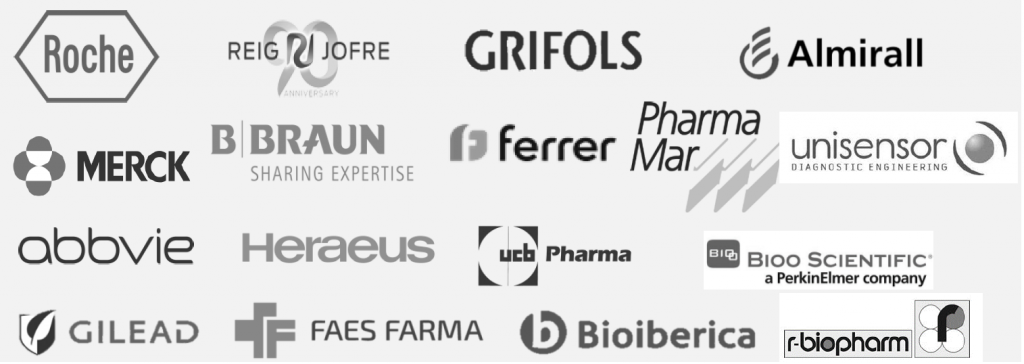
Our interview series delve into the journeys of 7 female researchers, their challenges, and the call for gender equality in science, inspiring the next generation.
March 8th 2024, NANBIOSIS (Spain)
Kicking off on 11F “International Day of Women and Girls in Science” 2024, and spanning all the way until Woman’s Day 2024, our interview series has aimed to highlight the life, career and opinions of some of the brilliant minds within our network. Today is time to wrap it up, and for this reason we present you a summary of each of them and a chance to take a deeper look.
In these series we delved into the remarkable journeys, research endeavors, and challenges faced by these exceptional women in their pursuit of scientific excellence. From unraveling the mysteries of nanotechnology to pioneering advancements in biosciences, each researcher’s story resonates with perseverance, resilience, and a fervent commitment to breaking barriers. With no doubt their collective message resonates loudly: a call to inspire and empower the next generation of aspiring researchers, regardless of gender, to embark on their own transformative journeys in the world of science and innovation, as well as speaking out on the issues that female researchers still encounter today.

Anna Aviñó speaks about her journey as a researcher and her captivating oligonucleotides.
“Oligonucleotides (…) are recently being approved as new advanced gene therapies for many diseases, including rare and cardiovascular diseases.”
—Dr. Anna Aviñó, scientific coordinator of Unit 29.
Our leading chemist, specialized in nucleic acid chemistry, was the first interview published in these series. She offered us insights into her current projects focused on synthetic and structural studies of oligonucleotides. With a deep understanding of their applications in gene therapies and biosensors, Dr. Aviñó highlighted her contributions to the field and addressed challenges faced as a woman scientist.
Through her expertise and dedication, she advocates for gender equality in science, emphasizing the importance of unbiased education and empowering young women to pursue careers in research.
You can read the full interview here.

Dr. Martín tells us about her innovations in cancer treatment with nanoparticles.
“There are challenging moments during a scientific career (…), but in the end, persistence pays off.”
—Dr. Ana Martín, collaborator scientist in Unit 9.
Ana has a multifaceted background spanning Veterinary Medicine, Biochemistry, and a Ph.D. And in this second part of our series she welcomed us into a world of scientific inquiry and innovation. In this interview, Ana shared her pioneering work in cancer research, utilizing nanoparticles for anti-tumor treatments. Ana also reflected on gender equality in science, the challenges of balancing motherhood with a scientific career, and her aspirations for a more inclusive scientific community.
You can read the full interview here.

Prof. Peña gave us her insightful point of view in overcoming challenges, embracing passion, and cultivating collaborative success towards career estabilization.
“The most important thing in your professional career is to dedicate yourself to something you love (…) that’s incredibly important from a professional point of view.”
—Prof. Estefanía Peña, Scientific Coordinator of Unit 13.
In a captivating interview, Professor Estefanía Peña shared her insights on overcoming challenges, nurturing passion, and fostering collaborative success in achieving career stability. Amidst the bustling R&D environment, Professor Peña’s laboratory serves as a beacon of innovation and determination. With enthusiasm and warmth, she discussed her journey in computational modeling and biomedical engineering, highlighting her experiences, hurdles, and victories. Professor Peña’s story resonates as a testament to perseverance and dedication, offering valuable advice to aspiring researchers on following their passions.
You can read the full interview here.

Our expert in nanocarriers talks about her journey from biotechnology to cancer therapy, an example of passion and perseverance in science.
“I am fortunate to be able to devote myself to something I am passionate about. Research is something I enjoy every day.”
—Dr. María Sancho, Researcher at Unit 9.
Dr. Sancho, our expert in nanocarriers and cancer therapy, shared with us her inspiring journey from biotechnology to groundbreaking research. Set in Zaragoza, Spain, the interview highlighted Maria’s passion and perseverance in pursuing scientific excellence. With warmth and enthusiasm, she discussed her innovative work in developing nanocarriers for targeted drug delivery in cancer treatment. Maria’s story serves as a beacon of inspiration for aspiring scientists, showcasing the transformative power of dedication and curiosity in the pursuit of scientific advancement.
You can read the full interview here.

Dr. Vílchez, our esteemed colloidal chemistry researcher, discusses her focus on water-in-water emulsions and microcoacervates. She highlights gender biases in science and advocates for inclusivity and recognition of women’s contributions.
“I would advise (young women) to pursue their dreams, to show others what they are capable of, and not to let themselves be underestimated.”
—Dr. Susana Vílchez, technical and quality manager of Unit 12.
Dr. Vílchez offered a profound insight into her research endeavors and career trajectory. Specializing in the characterization of colloidal systems such as micelles, vesicles, emulsions, and more, her current focus lies on the intriguing realm of water-in-water emulsions and the formation of microcoacervates, serving as a model for membraneless organelles (MLO) by introducing DNA into these emulsions. During the interview, Dr. Vílchez also shed light on the gender biases prevalent in her field and offered invaluable perspectives on fostering gender equality in science. Through her experiences and unwavering dedication, she inspires young women to pursue their scientific aspirations while advocating for broader inclusivity and recognition of women’s contributions in shaping the scientific landscape.
You can read the full interview here.

Dr. Mincholé discusses cardiac risk assessment, gender challenges in science, and the transformative potential of Digital Twins in healthcare research.
“(I) design and work on a research line that combines computational models with cardiac signals and images. This was done with the aim of stratifying arrhythmic risk and understanding its mechanisms.”
—Dr. Ana Mincholé, researcher at Unit 27.
In this part 6 of our interview series, Dr. Ana Mincholé discussed her groundbreaking work in cardiac risk assessment, gender challenges in science, and the transformative potential of Digital Twins in healthcare research. Dr. Mincholé’s insights offered a glimpse into her innovative approach to integrating computational models with clinical data to advance cardiac care. Her passion for science and dedication to promoting diversity in STEM shine through, underscoring the invaluable contributions of women in the field.
You can read the full interview here.
As a bosus, we have recently published the last of our interviews in our YouTube channel.
In this part VII, we had the pleasure to interview Dr. Eli Prats, a brilliant researches from Unit 8 and a fantastic science communicator. Watch it full here:
About NANBIOSIS:
The goal of NANBIOSIS is to provide comprehensive and integrated advanced solutions for companies and research institutions in biomedical applications. All of this is done through a single-entry point, involving the design and production of biomaterials, nanomaterials, and their nanoconjugates. This includes their characterization from physical-chemical, functional, toxicological, and biological perspectives (preclinical validation).
In order to access our Cutting-Edge Biomedical Solutions, place your request here.
NANBIOSIS has worked with pharmaceutical companies of all sizes in the areas of drug delivery, biomaterials and regenerative medicine. Here are a few of them:









